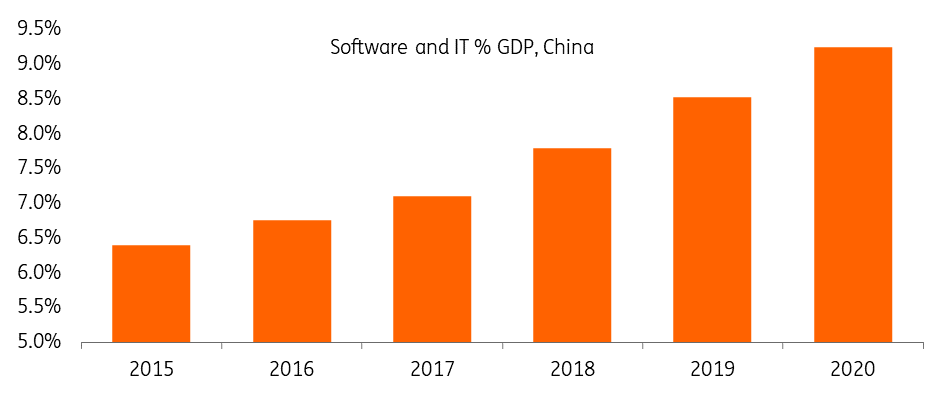China’s centenary speech spells a long tech war ahead
The message from Xi Jinping's speech marking the 100th anniversary of the Chinese Communist Party is clear - he wants China to be a force to be reckoned with, and we think this paves the way for a long and arduous tech war
Xi's message to the world
China's President Xi Jinping's hour-long speech marking the centenary of the ruling Communist Party last week was remarkable in many ways.
His comments against foreign rivals and the fact that Beijing would not allow "sanctimonious preaching" suggest China's stance is unlikely to soften when pressured by the US and its allies. Xi's comments seem to be directed both at Chinese nationals and foreign economies.
The tech war just became a lot more serious
Although the speech contained little information on new initiatives and policy objectives, it is worth noting that just before the speech, Liu He, Xi's economic czar was appointed to lead the development of chip technology. Liu was also the lead in the China-US trade negotiations in 2018 and has developed a reputation as a man for dealing with difficult tasks.
Alongside that, in early June, China also passed the Anti-Foreign Sanctions Law which allows the country to impose reciprocal sanctions on countries, companies or individuals in foreign countries. But so far, these sanctions have been limited to technology and its military use.
Putting all of this together, it would be rational to conclude that China is determined to wage a serious technology war against the US and its allies.
IT as a percentage of GDP in China

Policy implications
Cleaning up industry is only the start. The most eye-catching policies so far include spinning off fintechs from technology giants' basic apps (be it a shopping app or a messaging app) and focusing on data privacy.
The first policy is to prevent a financial crisis while the second has policy implications for foreign companies operating in China. By compelling local companies to comply with data privacy rules, foreign companies in China will have to do the same.
Going forward, we expect to see more policies to support the development of advanced technology in all areas, including semiconductor chips, big data centres, ESG and artificial intelligence. All of this needs money and Liu's appointment means there should be plenty of it. Some projects may attract foreign investment, which means capital inflows and technical support for Chinese companies. In turn, China will offer its gargantuan market.
The final question is speed. With other countries advancing their own technology, it's not clear when or even if China will win the tech race. What we do know is that this investment will count towards GDP, providing the economy with the much needed extra support.
Download
Download article
9 July 2021
Good MornING Asia - 9 July 2021 This bundle contains {bundle_entries}{/bundle_entries} articles"THINK Outside" is a collection of specially commissioned content from third-party sources, such as economic think-tanks and academic institutions, that ING deems reliable and from non-research departments within ING. ING Bank N.V. ("ING") uses these sources to expand the range of opinions you can find on the THINK website. Some of these sources are not the property of or managed by ING, and therefore ING cannot always guarantee the correctness, completeness, actuality and quality of such sources, nor the availability at any given time of the data and information provided, and ING cannot accept any liability in this respect, insofar as this is permissible pursuant to the applicable laws and regulations.
This publication does not necessarily reflect the ING house view. This publication has been prepared solely for information purposes without regard to any particular user's investment objectives, financial situation, or means. The information in the publication is not an investment recommendation and it is not investment, legal or tax advice or an offer or solicitation to purchase or sell any financial instrument. Reasonable care has been taken to ensure that this publication is not untrue or misleading when published, but ING does not represent that it is accurate or complete. ING does not accept any liability for any direct, indirect or consequential loss arising from any use of this publication. Unless otherwise stated, any views, forecasts, or estimates are solely those of the author(s), as of the date of the publication and are subject to change without notice.
The distribution of this publication may be restricted by law or regulation in different jurisdictions and persons into whose possession this publication comes should inform themselves about, and observe, such restrictions.
Copyright and database rights protection exists in this report and it may not be reproduced, distributed or published by any person for any purpose without the prior express consent of ING. All rights are reserved.
ING Bank N.V. is authorised by the Dutch Central Bank and supervised by the European Central Bank (ECB), the Dutch Central Bank (DNB) and the Dutch Authority for the Financial Markets (AFM). ING Bank N.V. is incorporated in the Netherlands (Trade Register no. 33031431 Amsterdam).

